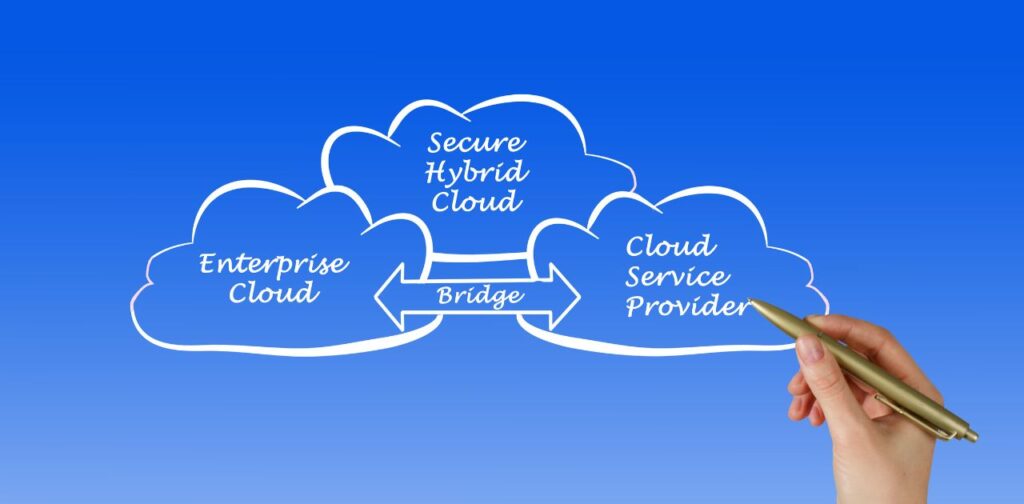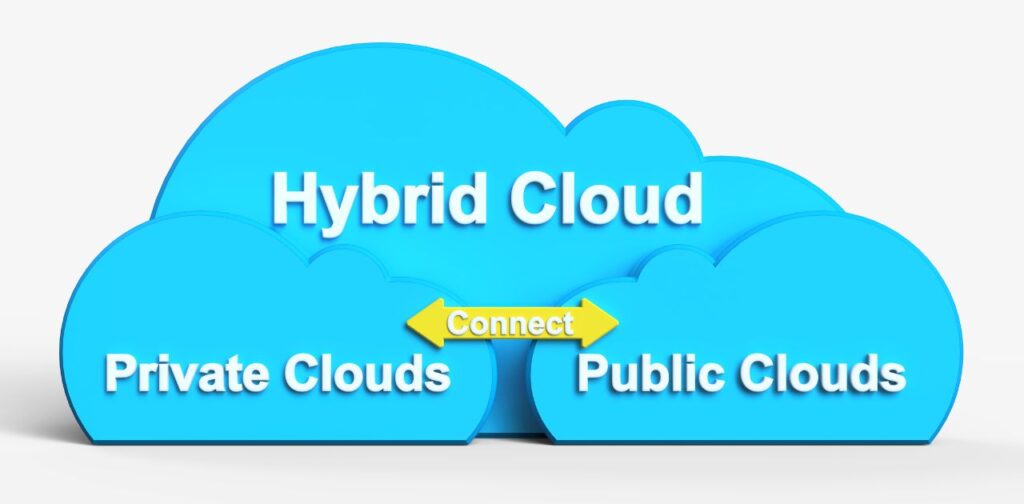What is hybrid cloud technology? Have you wondered what exactly a hybrid cloud is and why it’s essential for modern enterprises? This guide aims to demystify hybrid cloud technology and explore its significance in 2024 and beyond.
Hybrid cloud technology combines on-premises, private, and public cloud services for seamless coordination. It allows businesses to transfer data and applications smoothly between environments, providing greater flexibility and optimizing workloads.
Adopting hybrid cloud strategies is crucial as companies aim to boost agility while managing costs. This guide explores the latest trends, benefits, and strategies, empowering your business to leverage hybrid cloud technology in the evolving digital landscape effectively.
Table of Contents
What makes hybrid cloud technology a game changer?
Hybrid cloud technology is a game changer, offering more flexibility, better security, and increased innovation. By blending private and public clouds, businesses can manage workloads efficiently, scale resources, and adapt to market demands.
Flexibility and Scalability
A hybrid cloud enables businesses to dynamically adjust resources according to demand, offering unparalleled flexibility. This ensures that enterprises can scale up during peak times and down when demand decreases, optimizing resource use and minimizing costs.
Enhanced Security and Compliance
By keeping sensitive data on-premises and using public cloud resources for less critical tasks, the hybrid cloud upholds strict security standards. This helps companies meet compliance requirements and protect key information, building trust with clients and partners.
Driving Innovation
Hybrid cloud supports rapid experimentation and deployment, facilitating innovation. Businesses can develop and test new applications efficiently using cloud resources, leading to faster time-to-market for new solutions and remaining competitive in a fast-paced digital world.
How does the hybrid cloud enhance business flexibility today?

The hybrid cloud boosts business flexibility by allowing easy transitions between public and private cloud environments. This agility enables businesses to optimize operations and quickly respond to market changes, ensuring they stay competitive and efficient.
Seamless Integration
The hybrid cloud enables seamless integration of cloud services, ensuring consistent workflows. This allows teams to collaborate effectively, with data and applications accessible across the organization, reducing downtime and boosting productivity.
Rapid Adaptation
Businesses can quickly adapt to fluctuating workloads, scaling resources to match demand. During high-traffic or quieter periods, the hybrid cloud allocates resources efficiently, helping control costs while maintaining performance.
Enhanced Collaboration
Hybrid cloud technology enables team members to access tools and data from anywhere, promoting collaboration and innovation. This connectivity supports remote work, maintaining productivity and enhancing communication and creativity within global teams.
Why is the hybrid cloud vital for cost management?
Hybrid cloud technology is crucial for cost management by optimizing IT resources, balancing on-premises and cloud services, and providing flexible pricing models. This leads to significant savings, enabling businesses to allocate funds strategically and enhance operational efficiency.
Efficient Resource Utilization
- Elastic resources prevent overspending on unnecessary capacity.
- Balances workloads between public and private cloud platforms.
- Avoids the cost of maintaining idle on-premises infrastructure.
- Reduces capital expenses through flexible cloud resource allocation.
- Supports pay-as-you-go models, minimizing upfront investment.
Strategic Financial Planning
- Enables precise budgeting with predictable cost structures.
- Aligns IT expenditures with business growth and demand.
- Reduces the need for large capital outlays or investments.
- Forecasts spending accurately for specific cloud services used.
- Allocates savings to strategic business initiatives effectively.
Cost Transparency and Control
- Provides detailed insights into cloud usage and expenses.
- Enables easy identification of cost-saving opportunities.
- Grants control over spending through monitoring tools.
- Helps identify cost-efficient resource provisioning strategies.
- Promotes accountability with comprehensive financial reporting features.
What are the key trends in hybrid cloud technology?

Hybrid cloud technology is advancing to improve agility, sustainability, and security, aiding businesses in innovation, reducing carbon footprints, and bolstering cybersecurity. Adopting these trends helps maintain a competitive edge in the digital landscape.
Agility Enhancements
- Virtualization enables flexible resource allocation quickly.
- Automation tools streamline routine cloud management tasks.
- APIs facilitate seamless cloud service integrations easily.
- Edge computing reduces latency for critical data applications.
- Containerization simplifies deploying applications across environments seamlessly.
Sustainability Initiatives
- Energy-efficient cloud data centers minimize environmental impact.
- Green technologies reduce carbon emissions in operations.
- Renewable energy powers many next-gen cloud facilities.
- Efficient resource management reduces wasteful energy consumption.
- Sustainability practices attract environmentally-conscious customers easily.
Advanced Security Measures
- Zero-trust frameworks enhance data security across environments.
- AI-driven monitoring detects potential threats in real time.
- Encryption safeguards sensitive information from unauthorized access.
- Identity and access management ensure user authorization control.
- Compliance tools ensure adherence to industry security regulations.
Which strategies optimize hybrid cloud for enterprises?
Optimizing a hybrid cloud requires a blend of maintaining security, efficient workload management, and fostering seamless integration. By focusing on these areas, enterprises can maximize performance, reduce costs, and ensure a flexible, scalable infrastructure.
Security and Compliance Focus
Establish robust security protocols tailored for hybrid environments. Implement regular audits and access controls to safeguard sensitive data. Compliance tools help ensure adherence to industry standards, building trust with clients and partners.
Workload Management Techniques
Balance workloads effectively across public and private clouds. Use analytics to predict peak demand periods and allocate resources accordingly. This strategy not only improves performance but also keeps costs manageable by preventing resource wastage.
Streamlined Integration Processes
Facilitate easy data and application flow between cloud environments. Utilize APIs for seamless connectivity and ensure systems are compatible. This connectivity supports effective collaboration, allowing teams to work efficiently, no matter their location.
How can hybrid cloud technology future-proof businesses?
Hybrid cloud technology secures businesses’ futures by offering flexibility, resilience, and growth. It supports rapid innovation, adapts to market changes, and ensures strong data security.
Flexibility for Growth
A hybrid cloud provides scalable resources, facilitating smooth expansion as business needs evolve. This agility ensures organizations can rapidly enter new markets and seize opportunities without being constrained by traditional infrastructure limitations.
Robust Resilience
By utilizing multiple cloud environments, businesses protect against data loss and downtime. Enhanced disaster recovery strategies supported by hybrid cloud ensure swift recovery, minimizing impact and maintaining service availability for end users.
Continuous Innovation
The hybrid model empowers enterprises to experiment with new technologies and methodologies. By enabling quick testing and development cycles, businesses can rapidly implement innovative solutions, keeping them ahead in the competitive landscape.
Conclusion: What is hybrid cloud technology?
In conclusion, hybrid cloud technology empowers businesses to adapt swiftly to ever-evolving market demands with its unique blend of flexibility and innovation. It provides a scalable, secure, and sustainable solution that aligns IT strategies with business goals. By leveraging the power of hybrid clouds, companies can optimize resources, enhance productivity, and advance toward future growth seamlessly. Embracing this technology equips enterprises with the competitive edge needed to thrive in the digital age. Ready to embark on your hybrid cloud journey? Dive in and unlock new possibilities today!
FAQ
Q.01. What is hybrid cloud with an example?
A hybrid cloud is a computing setup that combines public and private clouds for managing data and applications. It allows businesses to leverage the scalability and cost-effectiveness of public clouds while securing sensitive data in a private cloud.
Q.02. What is the difference between cloud and hybrid cloud?
The main difference between a cloud and a hybrid cloud is that a cloud uses either public or private servers, while a hybrid cloud combines both. This enables businesses to take advantage of the benefits of both public and private clouds, such as cost-effectiveness and security.
Q.03. Is Netflix a hybrid cloud?
Yes, Netflix utilizes a hybrid cloud model, with a combination of public and private clouds. This allows them to handle high volumes of data and provide seamless streaming services to millions of users worldwide.
Q.04. Is Microsoft a hybrid cloud?
Yes, Microsoft offers a hybrid cloud solution with its Azure platform. This allows businesses to integrate their existing on-premise systems with the robust capabilities of the public cloud.

